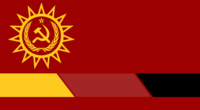German Soviet Socialist Republic: Difference between revisions
No edit summary |
No edit summary |
||
| Line 135: | Line 135: | ||
}} | }} | ||
The '''German Soviet Socialist Republic''' ({{wp|German language|German}}: Deutsche Sozialistische Sowjetrepublik; {{wp|Russian language|Russian}}: Германская Советская Социалистическая Республика), abbreviated as the '''German SSR''', '''GerSSR''' and also known as '''Soviet Germany''' or just '''Germany''', is one of the [[Republics of the Soviet Union|constituent republics]] of the [[Soviet Union (Yoyman)|Soviet Union]]. Under the Soviet {{wp|One-party state|one-party model}} it is governed by the [[Communist Party of the Soviet Union]] through it's {{wp|Soviet Democracy|republican branch}}, the [[Communist Party of Germany]]. | The '''German Soviet Socialist Republic''' ({{wp|German language|German}}: Deutsche Sozialistische Sowjetrepublik; {{wp|Russian language|Russian}}: Германская Советская Социалистическая Республика), abbreviated as the '''German SSR''', '''GerSSR''' and also known as '''Soviet Germany''' or just '''Germany''', is one of the [[Republics of the Soviet Union|constituent republics]] of the [[Soviet Union (Yoyman)|Soviet Union]]. Under the Soviet {{wp|One-party state|one-party model}} it is governed by the [[Communist Party of the Soviet Union]] through it's {{wp|Soviet Democracy|republican branch}}, the [[Communist Party of Germany]]. Germany lies between the {{wp|Baltic sea|Baltic}} and {{wp|North Sea}} to the north and the {{wp|Alps}} to the south. Its 16 constituent [[Administrative Districts of the German SSR|oblasts]] have a total population of over 84 million in an area of 357,600 km2 (138,100 sq mi). It borders {{wp|Denmark}} to the north, the [[Polish Soviet Socialist Republic|Polish SSR]] and the [[Czechoslovakian Soviet Socialist Republic |Czechoslovakian SSR]] to the east, [[Austrian Soviet Socialist Republic|Austrian SSR]] and {{wp|Switzerland}} to the south, and {{wp|France}}, {{wp|Luxembourg}}, {{wp|Belgium}}, and the {{wp|Netherlands}} to the west. The nation's capital and most populous city is {{wp|Berlin}} | ||
Revision as of 16:43, 1 June 2024
This article is incomplete because it is pending further input from participants, or it is a work-in-progress by one author. Please comment on this article's talk page to share your input, comments and questions. Note: To contribute to this article, you may need to seek help from the author(s) of this page. |
German Soviet Socialist Republic | |
|---|---|
| Motto: Arbeiter aller Länder: Vereinigt euch! "Workers of the world, unite!" | |
| Anthem: Auferstanden aus Ruinen
| |
| Capital and | Berlin |
| Official languages | Russian German |
| Religion | Secularism |
| Demonym(s) | German, Soviet, German Soviet |
| Government | Unitary Marxist–Leninist one-party Soviet socialist republic |
• Prime Minister | Kevin Kühnert |
• First Secretary of the Communist Party of Germany | Saskia Esken |
| Legislature | Supreme Soviet |
| History History of communist rule & Soviet occupation. | |
• GDR established | 7 October 1949 |
| 14 May 1955 | |
• Integration into the Soviet Union | 27 September 1955 |
| 21 August 1973 | |
• Independence from the Soviet Union | 27 October 1987 |
• Soviet invasion & reintegration | September-August 1994 |
| 31 December 1999 | |
• Current constitution | 25 February 2016 |
| Area | |
• | 357,600 km2 (138,100 sq mi) |
| Population | |
• 2023 census | 84,607,016 |
| HDI | very high |
| Currency | Soviet Ruble (SUR) |
| Time zone | UTC+1 (CET) |
• Summer (DST) | UTC+2 (CEST) |
| Date format | CE, mm/dd/yyyy |
| Driving side | "right" |
| Calling code | +7 |
| ISO 3166 code | SU |
| Internet TLD | .su |
The German Soviet Socialist Republic (German: Deutsche Sozialistische Sowjetrepublik; Russian: Германская Советская Социалистическая Республика), abbreviated as the German SSR, GerSSR and also known as Soviet Germany or just Germany, is one of the constituent republics of the Soviet Union. Under the Soviet one-party model it is governed by the Communist Party of the Soviet Union through it's republican branch, the Communist Party of Germany. Germany lies between the Baltic and North Sea to the north and the Alps to the south. Its 16 constituent oblasts have a total population of over 84 million in an area of 357,600 km2 (138,100 sq mi). It borders Denmark to the north, the Polish SSR and the Czechoslovakian SSR to the east, Austrian SSR and Switzerland to the south, and France, Luxembourg, Belgium, and the Netherlands to the west. The nation's capital and most populous city is Berlin
